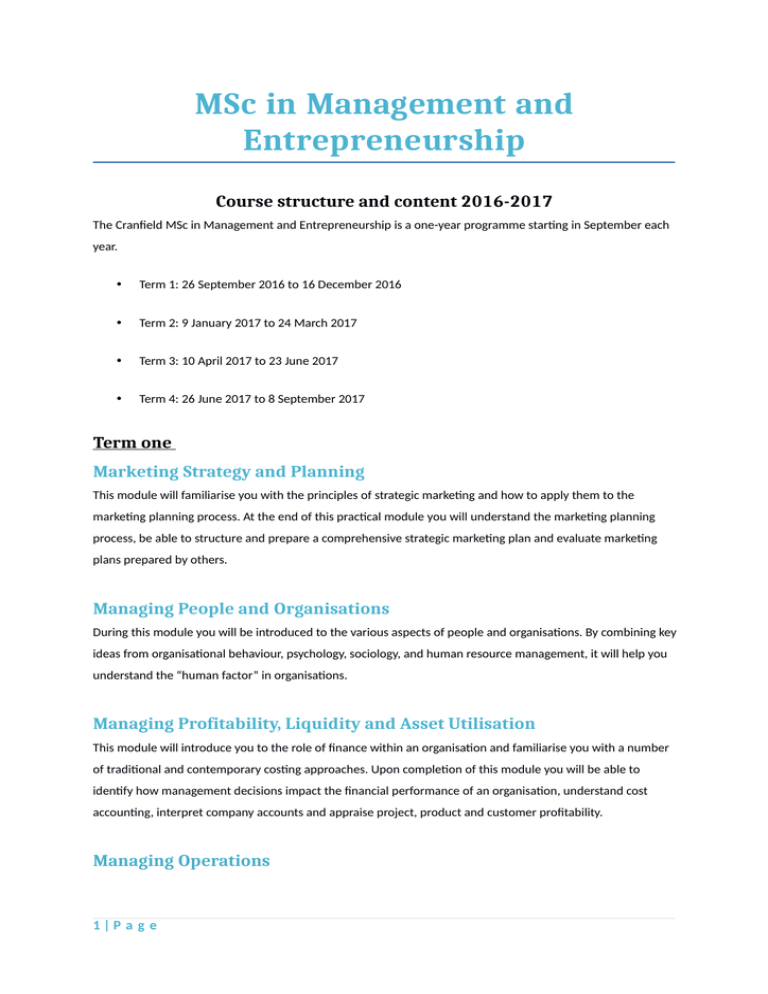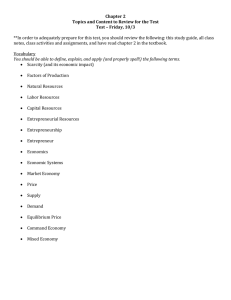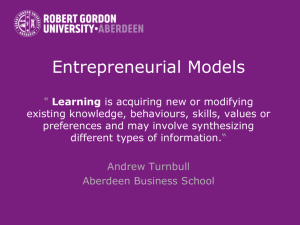MSc in Management and Entrepreneurship Course structure and content 2016-2017
advertisement

MSc in Management and Entrepreneurship Course structure and content 2016-2017 The Cranfield MSc in Management and Entrepreneurship is a one-year programme starting in September each year. Term 1: 26 September 2016 to 16 December 2016 Term 2: 9 January 2017 to 24 March 2017 Term 3: 10 April 2017 to 23 June 2017 Term 4: 26 June 2017 to 8 September 2017 Term one Marketing Strategy and Planning This module will familiarise you with the principles of strategic marketing and how to apply them to the marketing planning process. At the end of this practical module you will understand the marketing planning process, be able to structure and prepare a comprehensive strategic marketing plan and evaluate marketing plans prepared by others. Managing People and Organisations During this module you will be introduced to the various aspects of people and organisations. By combining key ideas from organisational behaviour, psychology, sociology, and human resource management, it will help you understand the “human factor” in organisations. Managing Profitability, Liquidity and Asset Utilisation This module will introduce you to the role of finance within an organisation and familiarise you with a number of traditional and contemporary costing approaches. Upon completion of this module you will be able to identify how management decisions impact the financial performance of an organisation, understand cost accounting, interpret company accounts and appraise project, product and customer profitability. Managing Operations 1|P a g e In this module you will learn about the strategic role of operations and how to design and manage the operations process. It will cover the tools and techniques of process improvement, capacity and inventory management, quality management, and performance management. Entrepreneurship This module will provide you with the knowledge and skills required for the management of new ventures. You will gain a broad understanding of the business environment, economics, strategy and finance across the entrepreneurial life cycle and the growth, development and evolution of new ventures. Family Business Management Managing a family business provides many complexities and this module will equip you to succeed in this unique setting. You will critically analyse family business life cycles, learn professional management concepts for strengthening performance and evaluation tools. By the end of this module you will be able to demonstrate strategic planning skills for balancing conflicting emands, growth, governance and the regeneration of the family business. Term two Strategic Management This module will examine the key challenges that companies face and the range of approaches they employ as they seek to navigate complex environments. You will develop your ability to make strategic decisions, improve your ability to think strategically and apply various strategic management tools and techniques in practice. Disruptive Innovation You will gain practical experience of developing a disruptive innovation through a group design exercise that will be presented to practitioners. You will learn to identify and apply recent, relevant theory to the study of disruptive innovation, identify a target for disruptive innovation, and understand the importance of a coherent value proposition. Managing Business Growth 2|P a g e Drawing on Cranfield’s long association with high-performing businesses, this module will familiarise you with the life-cycle of the entrepreneurial business from start-up through to exit, via sale or succession. You will analyse the personal journey that a successful entrepreneur will undergo in the development of his/her business and learn to deploy a set of techniques for describing and overcoming challenges. Entrepreneurial Finance This is a very practical module, enabling you to assess business plans and develop a funding strategy for an entrepreneurial venture. You will become familiar with the different sources of funding available across the entrepreneurial life cycle and learn how to identify the most appropriate source for each stage, including debt and equity funding and emerging alternatives such as crowd funding. You will learn a variety of company valuation techniques and how to structure a term sheet for seeking early-stage equity investment, as well as preparing an investment pitch to raise funding. Corporate Entrepreneurship You will learn how a large organisation needs to be structured, organised and managed to keep its entrepreneurial spirit alive. By the end of the module you will be able to understand in detail how corporate entrepreneurship can be achieved and how to deal with important issues like vision and values, leadership style and team building. Social Enterprise Management This module will familiarise you with the concepts of social enterprise. You will be introduced to the history and evolution of non-mainstream modes of social entrepreneurship, develop an understanding of how different types of entrepreneurs operate in different environments and learn how they are regarded by policy-makers and other stakeholders. You will be taught to present a clear case for which models of activity are effective and sustainable and become familiar with the measures of impact used to define the effectiveness of these enterprises. Terms three and four Research Methods and Statistics This module will equip you to design, conduct and report on your research project. You will learn to articulate and define management problems and design research that will help you to make informed management decisions. Thesis You will have the choice to write a detailed business plan, or undertake a major research project based on a real entrepreneurial business issue, for an organisation of your choice. You will apply your management 3|P a g e knowledge, skills and analytical abilities to real-life situations and demonstrate your ability to research, critically evaluate data and information and apply tools and techniques to solve management problems. 4|P a g e








